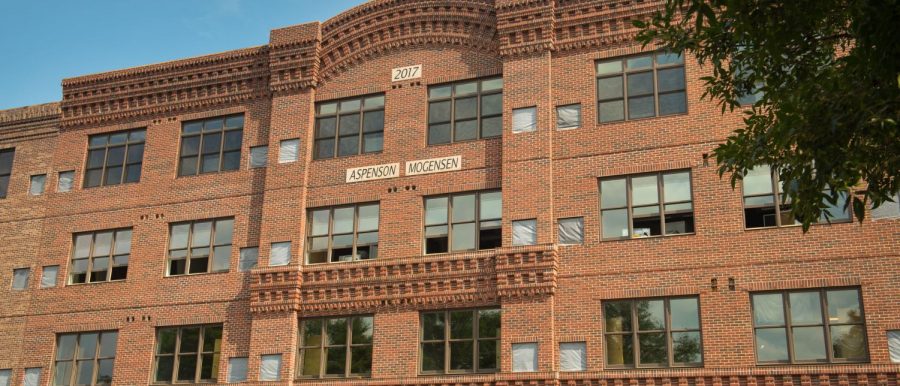The concern for university housing continues
Aspenson-Mogenson and Katherine Thomas RAs under pressure from COVID-19 isolation halls
More stories from Evelyn Nelson
Photo by SUBMITTED
Katherine Thomas RAs were relocated to Aspenson-Mogensen and joined their staff for the 2021 spring semester. Both RA staffs are now required to do additional rounds at each of the quarantine isolation halls.
Resident assistants at UW-Eau Claire have continued to face safety concerns since the COVID-19 pandemic began. Now, concerns lie with those who are responsible for supervising two COVID-19 isolation buildings: Katherine Thomas and Putnam Halls.
Since the closure of Katherine Thomas Hall for quarantine and isolation needs in February, KT RAs were relocated to Aspenson-Mogensen and joined that staff for the 2021 spring semester, according to housing and residence life staff.
Deborah Newman, associate director of housing and residence life, said last semester Katherine Thomas RAs were responsible for doing “on-duty” rounds in Putnam Hall each night.
“The huge majority of our students in the residence halls have had a safe, positive experience this year,” Newman said. “Our efforts have been successful at keeping infection rates very low in the residence halls. Our RAs have really helped insure this for themselves and their residents by enforcing masking and visitation policies.”
As of spring 2021, Aspenson-Mogenson and Katherine Thomas resident assistants are not required to work at the Towers desk, as all other RAs on campus did during the fall semester, Newman said.
The resident assistant duties have been lightened because of the Katherine Thomas Hall staff joining Aspenson-Mogenson Hall, an anonymous source said. However, staff members feel they were loaded with more work to do at Putnam hall — work that had higher safety risks.
Resident assistants are required to walk to Putnam and Katherine Thomas hall between 7 p.m. and 8 p.m to do rounds within KT and Putnam, as well as midnight rounds on weekends, the source said.
“This may not seem like much on paper, but when accounting that the staff has to walk a half mile from AMH to KT/Putnam — creating a round trip of two miles all together at night and sometimes in freezing temperatures — many safety concerns are brought up,” the anonymous source said.
RAs are also supposed to be on call between 8 p.m. and 6 a.m. in case of any duty calls, they said.
Newman has confirmed RAs will soon be provided with a campus vehicle to drive across the UW-Eau Claire bridge to do nightly rounds at the isolation residence halls.
“Our vice chancellor for business services has been able to find funds to repair a vehicle which will be used as a shuttle service for students on campus soon,” Newman said. “RAs may contact the service to travel around campus, and when it is not in use, it will be stored at AMH and be available for an RA use.”
Without the support of a campus vehicle, RAs were concerned about the safety of staff who were walking alone at night, an anonymous source said.
The freezing temperatures from the previous two weeks did not make the experience any more pleasant, a source said.
“As a campus, we are prideful that the walking bridge is one of the coldest places in Wisconsin during the winter,” an anonymous source said. “But, when our staff was concerned about walking in those conditions, it felt like all of that ‘pride’ went away and we were brushed off and told to suck it up.”
Newman said if students are concerned for their safety or traveling at night during their responsibilities as an RA, there are multiple avenues given from their previous COVID-19 housing training to add comfort within the position.
“[Resident assistants] should follow their training and wear the PPE provided, as both are based on CDC recommendations and best practices,” Newman said. “We also suggested that if RAs feel concerned, they can ask another RA to travel with them.”
An anonymous source said they disagree with this statement, and they said having another RA walk, or do rounds, with them can be seen as unfair. If they are not on duty, another RA should not have to commit more time than they were assigned to, the source said.
“My biggest concern is the allocation of three building responsibilities given to two RA staff,” the source said. “I believed that hazard pay was necessary for last semester, and now that we are working more and in higher-risk settings, I believe it should be required from housing.”
The resident assistants of Aspenson-Mogenen said the best way to create a better environment for housing employees is to have an open conversation, without concern for losing their positions when they advocate for certain issues to be addressed.
“RAs shouldn’t have to be afraid of getting fired if they speak up,” an anonymous source said. “I really hope our leaders will start listening and hopefully we can make more changes together.”
Nelson can be reached at [email protected].











